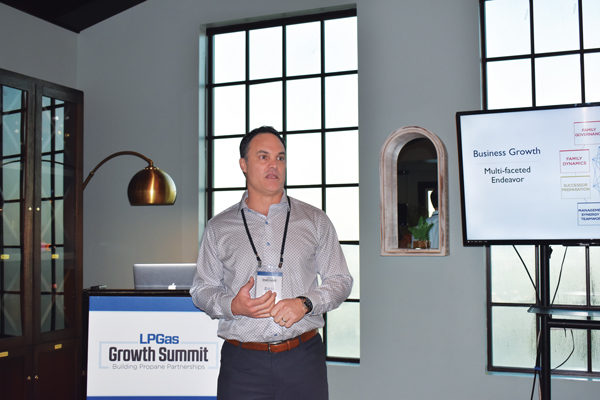Reimagine company culture for better employee retention
Company culture matters. That was the message 2022 LP Gas Growth Summit attendees heard during the first morning of the event as two members of business strategy firm The Rawls Group – Kendall Rawls, director of development, and Dan Iosue, succession planner – discussed ways to improve employee recruitment and retention at propane companies.
Why define a culture?
Company culture is the sum of the shared goals, vision, values, practices and attitudes in a workplace.
According to Rawls, culture is either implied or expressed. An expressed culture is intentionally defined for employees. Conversations take place about how team members should treat one another, customers and partners. Companies should pursue an expressed culture for a number of reasons.
First, without an expressed culture, Rawls says, employees “figure it out or create it right on their own,” generally choosing what is in their best interest. The issue with that, she explains, is that there are multiple definitions of culture throughout an office, often leading to conflict and confusion.
In addition, a defined culture becomes a recruiting tool in and of itself. It leads to happier employees who are eager to promote the company to their friends, neighbors and family who may be interested in joining the team.
“If you have a strong team in your organization and [outside] people are looking for work, [current employees] are going to say: ‘Hey, I work at a really great place. Why don’t you come work with us?’” Rawls says. “That’s a really great recruiting strategy because now you have someone who you trust that is bringing on someone that trusts you.”
A mutually beneficial relationship
A positive company culture benefits both the employees and company.
When companies are searching for potential new hires, they have several traits in mind.
“We want people at our workplace to engage,” Iosue says. “We want them to be resilient and show some grit and be flexible. We want them to be accountable, to have independence and autonomy to make the decisions that we want them to make when we’re not around. So we have some leadership leverage. We want them to work fast; we want them to be empowered. We basically want them to be superstars.”
Meanwhile, employees look for four things from employers: purpose, education, autonomy and feedback. These, in turn, give back to the company by creating motivated, engaged employees, Rawls and Iosue explain.
Purpose. When a company’s mission is clear, employees have a defined sense of purpose. That provides meaning to employees’ day-to-day roles and inspires them to work toward a common goal.
Education. Providing educational and developmental opportunities increases employee engagement. A company leader should understand who is on their team, where they are from a skills perspective and how to create education and development programs to bring them up.
Autonomy. Autonomy boosts morale and gives employees a sense of ownership in their work. According to Rawls, that ultimately leads back to the idea of purpose.
“If they understand their purpose, they understand how they impact [people],” she says. “They understand what their clear roles and responsibilities are.”
Feedback. Frequent feedback for employees creates a more open dialogue.
“What we’re finding is that more frequent developmental conversations with people goes a long way as far as how they feel they’re viewed in the organization,” Iosue says.
Ultimately, to retain employees and achieve business objectives, employers should evaluate if their workplace culture is supported by employees. Employees who stand behind a company’s culture are more motivated to excel and give back.
“Fundamentally, without great people and people who are engaged and inspired, whatever your vision is and goals are, [they] can’t be carried out,” Rawls says.




















